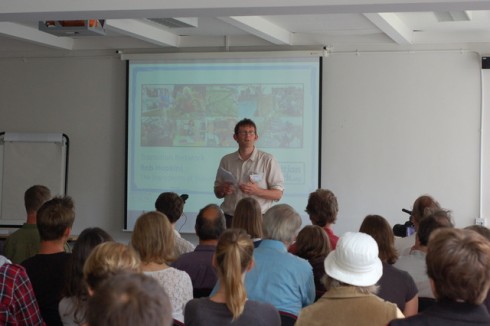10 Jul 2011
My workshop on ‘Transition as Cookery’ at the 2011 Transition Network conference
There’s loads of great material being generated over at the Transition Conference blog, but I thought I would put the audio file of my workshop up here for your listening pleasure. The subject of the workshop was the ‘Ingredients of Transition’ which form the bulk of the forthcoming Transition Companion. You can hear the full audio of the talk here. Thanks to Chris for recording it. I didn’t talk for that long though, the bulk of the workshop consisted of two exercises which I’ll write about in more detail in another post. Both gave me some very useful insights into a possible new tool which Transition initiatives could find really useful. More later. It’s been a fantastic event so far….

claude saint-jarre
10 Jul 2:43pm
Hello. Perhaps an ingredient would be the use of the theory of multiple intelligences to ” teach” or explain or present the idea of peak oil , climate changes, economic crisis. Then, i know you use sometimes the six hats method of Edward de Bono; he has another point of view: operacy. How to construct ideas, how to generate them, how to implement them. This is operacy.
Jeff Mowatt
11 Jul 6:37am
I noted the topic of Business, Economics and Social Enterprise and the thorny issue of funding – something very topical in the Guardian social enterprise network at this time.
Our own beginnings as what is described now as social business, i.e. a trading company with no dividend distribution and a primary social aim, begins with a white paper in which the suggested approach is a business which begins by investing at least 50% of profit into a community via an irrevocable trust fund which will seed fund new instances of this ‘community investment’ approach.
When first deployed to source a localisation initiative it was used to leverage further investment in the form of a community microfinance back. It began in 1999 in the wake of Russia’s own economic crisis and a top-down development approach by US government. The suggestion was – lets invert the approach and stimulate creation of wealth in local communities.
It’s this approach we bring to the UK in 2004 and in hindsight to a culture not ready for it. The foundation grant funded approach prevailed.
The founding paper had offered a critique of free market capitalism and debt, with a suggestion for an alternate co-existing paradigm for creating new wealth flows by means of localised ‘people-centered’ economics.
Economics in Transition began in 2009 at the international Economics for Ecology conferences at Sumy State university. It provided students with a background to TBL economics, the economic crisis and the treatise which was the core argument from the 1996 white paper.
http://www.p-ced.com/1/projects/ukraine/sumy/
We ran into a brick wall over funding in 2004 and that’s how things seem to have remained as other discover the same obstacles. We’ve survived by operating in the supply chain of major organisations, though this has not provided the funding required for new initiatives.
Things may now be changing, one hopes with the advent of the Localism Bill. I see potential locally for shared asset investment which will leverage FIT and RHI funding, to be used as part of an ongoing “community interest” approach to create local employment and yield revenue for social objectives. What I can’t seem to do locally. is to stimulate any interest from TT where I live in the Forest of Dean.